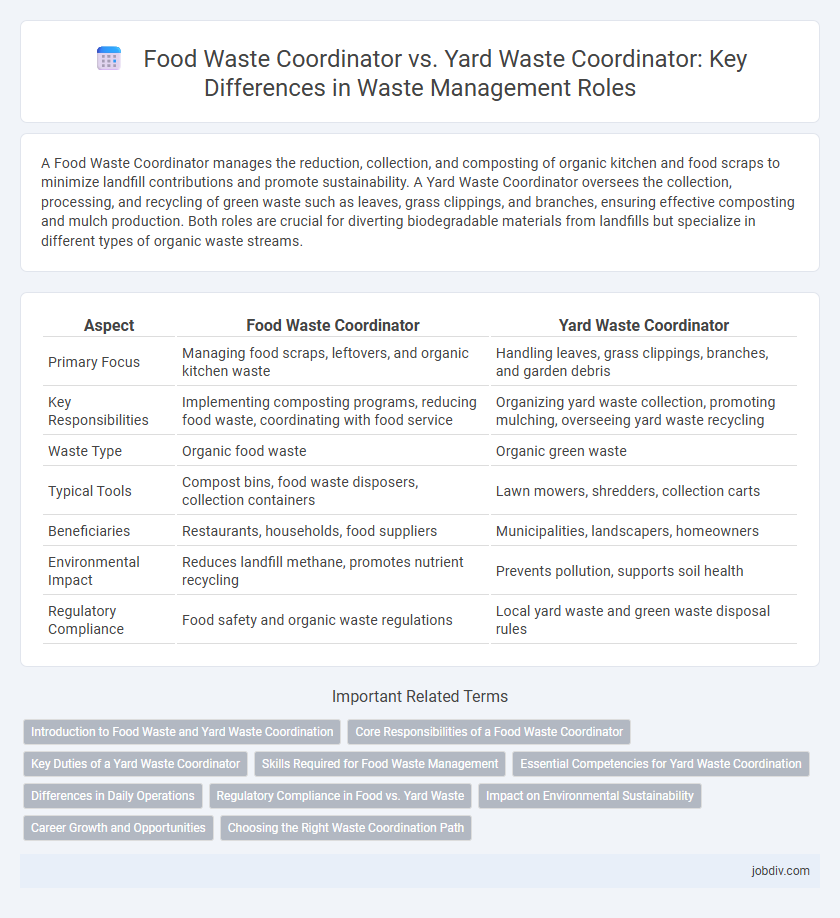A Food Waste Coordinator manages the reduction, collection, and composting of organic kitchen and food scraps to minimize landfill contributions and promote sustainability. A Yard Waste Coordinator oversees the collection, processing, and recycling of green waste such as leaves, grass clippings, and branches, ensuring effective composting and mulch production. Both roles are crucial for diverting biodegradable materials from landfills but specialize in different types of organic waste streams.
Table of Comparison
| Aspect | Food Waste Coordinator | Yard Waste Coordinator |
|---|---|---|
| Primary Focus | Managing food scraps, leftovers, and organic kitchen waste | Handling leaves, grass clippings, branches, and garden debris |
| Key Responsibilities | Implementing composting programs, reducing food waste, coordinating with food service | Organizing yard waste collection, promoting mulching, overseeing yard waste recycling |
| Waste Type | Organic food waste | Organic green waste |
| Typical Tools | Compost bins, food waste disposers, collection containers | Lawn mowers, shredders, collection carts |
| Beneficiaries | Restaurants, households, food suppliers | Municipalities, landscapers, homeowners |
| Environmental Impact | Reduces landfill methane, promotes nutrient recycling | Prevents pollution, supports soil health |
| Regulatory Compliance | Food safety and organic waste regulations | Local yard waste and green waste disposal rules |
Introduction to Food Waste and Yard Waste Coordination
Food waste coordinators specialize in managing and reducing organic food discards through strategies like composting, donation programs, and waste audits. Yard waste coordinators focus on the collection, processing, and recycling of garden debris such as leaves, grass clippings, and branches to divert material from landfills. Both roles aim to enhance sustainability practices and minimize environmental impact by optimizing resource recovery within their respective waste streams.
Core Responsibilities of a Food Waste Coordinator
A Food Waste Coordinator manages the collection, segregation, and processing of edible and inedible food scraps to reduce landfill impact and promote composting or donation programs. They collaborate with restaurants, grocery stores, and community organizations to implement waste reduction strategies and ensure compliance with food waste regulations. Monitoring data on food waste generation and recovery rates is essential to optimizing diversion efforts and achieving sustainability goals.
Key Duties of a Yard Waste Coordinator
A Yard Waste Coordinator manages the collection, processing, and disposal of organic yard debris such as leaves, grass clippings, and branches, ensuring compliance with municipal regulations and environmental standards. Key duties include organizing community compost programs, coordinating with waste haulers for efficient pickup schedules, and implementing educational campaigns to encourage proper yard waste segregation. The role demands monitoring contamination levels in yard waste streams and optimizing resource recovery to reduce landfill contributions.
Skills Required for Food Waste Management
Food Waste Coordinators require expertise in organic waste segregation, knowledge of composting techniques, and understanding of regulations related to food safety and waste disposal. Skills in data analysis for tracking waste reduction, strong communication to engage stakeholders, and proficiency in creating educational programs are essential. Unlike Yard Waste Coordinators, food waste specialists prioritize handling perishable materials, contamination prevention, and coordinating with food donation and recovery programs.
Essential Competencies for Yard Waste Coordination
Effective Yard Waste Coordinators require deep knowledge of organic waste management, including composting processes and sustainable disposal methods. Mastery of local regulations on yard debris collection and expertise in seasonal waste patterns enable efficient program planning and community education. Strong communication and logistical skills facilitate coordination between municipal services, contractors, and residents to optimize yard waste diversion and reduce landfill use.
Differences in Daily Operations
A Food Waste Coordinator manages the collection, segregation, and processing of organic food scraps, ensuring compliance with health and safety regulations while coordinating with local composting facilities and food banks. In contrast, a Yard Waste Coordinator oversees the handling of garden debris such as leaves, branches, and grass clippings, often collaborating with landscaping services and municipal mulch programs. Both roles require detailed scheduling and stakeholder communication but differ significantly in the types of waste they process and their respective disposal or recycling methods.
Regulatory Compliance in Food vs. Yard Waste
Food Waste Coordinators ensure regulatory compliance by adhering to strict federal and state guidelines on the handling, storage, and disposal of organic food materials to prevent contamination and promote safe composting or donation. Yard Waste Coordinators manage compliance with local ordinances and environmental regulations focused on green waste segregation, proper collection methods, and reduction of landfill contributions through mulching and composting programs. Both roles require continuous monitoring of changing waste management laws to maintain sustainability standards and avoid penalties.
Impact on Environmental Sustainability
Food Waste Coordinators primarily focus on reducing organic waste by managing composting programs and diverting food scraps from landfills, significantly lowering methane emissions and conserving landfill space. Yard Waste Coordinators oversee the collection and processing of garden debris, promoting composting and mulching that enhance soil health and reduce the need for chemical fertilizers. Both roles play a crucial part in environmental sustainability by minimizing waste, reducing greenhouse gases, and supporting circular economy practices.
Career Growth and Opportunities
Food Waste Coordinators specialize in managing organic waste from households and businesses, focusing on composting programs and sustainability initiatives, which creates opportunities in urban agriculture and environmental consultancy. Yard Waste Coordinators concentrate on managing landscape debris, offering career growth in municipal waste management and landscaping services. Both roles contribute to environmental preservation but diverge in industry application and specific expertise, affecting career trajectory and specialization options.
Choosing the Right Waste Coordination Path
Selecting the appropriate waste coordination path depends on understanding the distinct responsibilities of a Food Waste Coordinator and a Yard Waste Coordinator. A Food Waste Coordinator manages the collection, diversion, and processing of organic food scraps to reduce landfill contributions and enhance composting efforts. In contrast, a Yard Waste Coordinator focuses on handling garden debris such as leaves, branches, and grass clippings, optimizing their reuse in mulch and landscaping projects.
Food Waste Coordinator vs Yard Waste Coordinator Infographic

 jobdiv.com
jobdiv.com